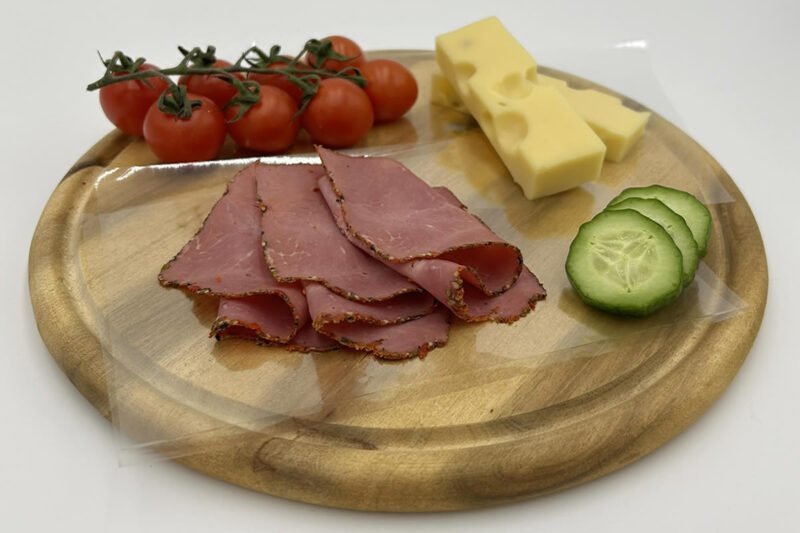
Stock range
It makes sense to wrap or cover high-quality food with a natural product instead of using plastic wrap. If you are thinking about switching to more environmental awareness and aroma protection, we will be happy to advise you.
Interesting facts about cellophane
- Cellophane film is the oldest film packaging suitable for direct food contact.
- The Swiss Jacques E. Brandenberger invented the paper film back in 1908 and launched it on the market under the Cellophan™ brand.
- Until after the Second World War, cellophane was practically the only packaging film. It is considered a pioneering plastic because of its transparency.
- Cellophane (later cellophane) therefore became the name for all transparent films.
- Due to its former popularity, many plastic films are still mistakenly referred to as "cellophane film" or "cellophane".
- The term cellophane is made up of the raw material cellulose and the ancient Greek word for transparent, "διαφανής; diaphanés".
- During production, wood pulp, a cellulose pulp, is dissolved in caustic soda and carbon disulphide. This produces a viscous mass (viscose). This is cleaned with filter presses and poured through a splitting nozzle into a precipitation bath, where the cellulose then precipitates. This process is repeated several times. After the last bath, the cellulose film is applied to heated rollers and dried. It can then be wound up.
6 good reasons for cellophane
Our cellophane blanks and trays are particularly suitable for fresh food and baked goods.
- Cellophane is permeable to water vapor. This protects the aroma and freshness of the products and prevents them from drying out.
- The fresh produce can "breathe". This prevents condensation on the film and moisture on your product.
- Your products are optimally protected against external influences. Cellophane protects against contamination and, as it is waterproof, also against moisture.
- Cellophane is guaranteed to protect against oxidation - unsightly discoloration is a thing of the past.
- Cellophane looks soft and silky, but still feels firm.
- Your products automatically have a high-quality appearance, as cellophane has a light gold tone and a beautiful shimmering effect.
Your customers will not only be impressed by the look of your packaging, but will quickly notice that the quality and shelf life of your food will increase. The fact that it is ecological packaging is another plus point. This will turn your customers into regular customers.
Smaller ecological footprint
What is the ecological difference between cellophane films and plastic films (PP, PE, etc.)?
- Conventional plastic film is made from fossil raw materials and takes up to 500 years to biodegrade.
- Cellophane is made with cellulose from wood, i.e. from renewable raw materials - and is garden compostable.
Plastic causes many problems:
- Pollution of the waters
- Threat to marine life
- Plastic particles in our food
- Waste of a finite, precious raw material
Cellophane, on the other hand, degrades, does not create mountains of waste and does not endanger the health of animals or humans.
The problems caused by plastic have also been recognized by the legislator, taken up in the Packaging Act (since 2019) and tightened by the new amendment as Packaging Act2 (since 2022). By using cellophane, you not only meet the legal requirements, but also fulfill the wishes of end customers, who are increasingly giving preference to ecological packaging.
